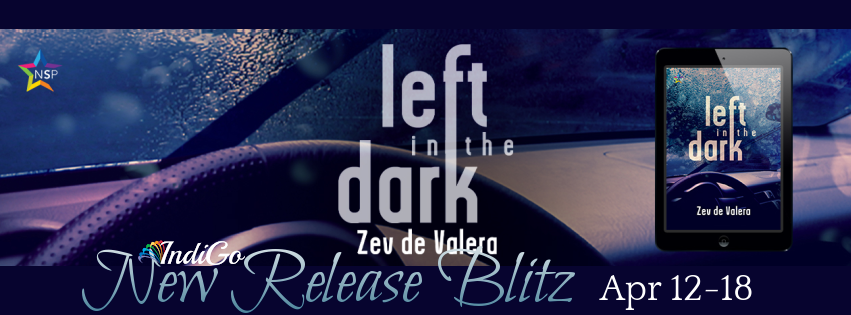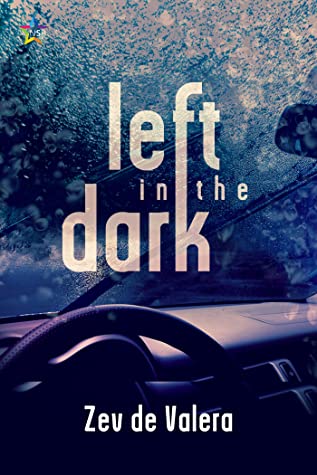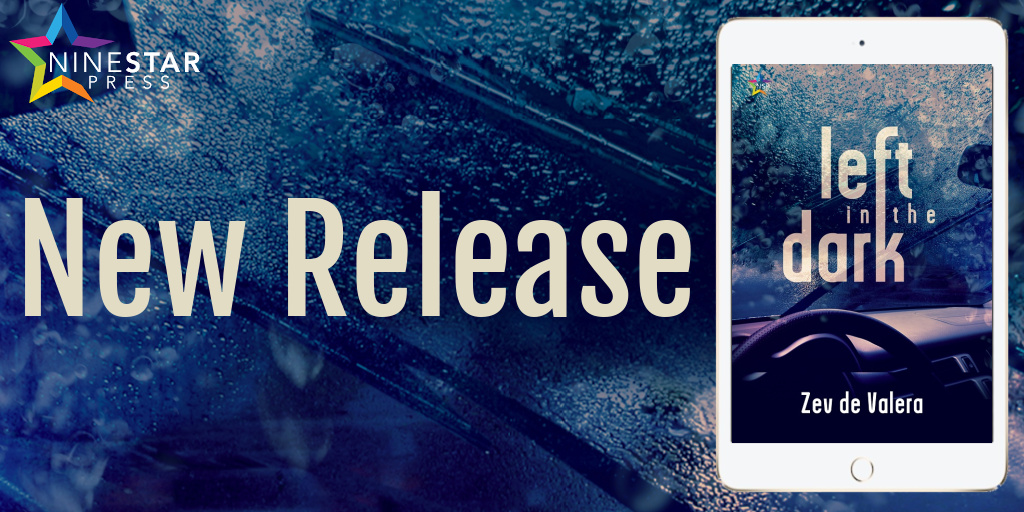
Title: Left in the Dark
Author: Zev de Valera
Publisher: NineStar Press
Release Date: 04/12/2021
Length: 53200
Genre: Contemporary, LGBTQIA+, contemporary, mystery, artist, PT, temporary disability and amnesia, accident recovery, PTSD, age-gap, over 40, kids, cheating, deception, family drama
Add to Goodreads

Description
Cal Restrepo, victim of a road rage automobile accident, emerges from unconsciousness into a world he does not recognize.
Under the care of the doctors at Wending Hills and the help of his friends and neighbors, Cal gradually recovers his memory and the full use of his body. Yet, so many of the memories do not fit what he feels is the “real” Cal.
Are his memories still clouded and unreliable, or was the Cal Restrepo who existed before the accident someone entirely different than the man who survived?
Left in the Dark
Zev de Valera © 2021
All Rights Reserved
Duguay had checked my vitals, and I was preparing coffee while he sat in the breakfast nook making notes on his laptop. There was a companionable silence as we went about our duties, punctuated now and then by the click of Duguay’s keyboard or the gurgle of the coffee machine.
The events of the previous day seemed distant and bizarre when contemplated in the air of quiet confidence and good cheer which Duguay brought with him. His presence enabled me to compartmentalize the anxiety I harbored over my relationship with Eric and concentrate on positive thoughts. The song “Happy Talk” from the musical South Pacific popped into my head, and I snorted a laugh as I selected tableware.
Duguay looked up from his laptop, his eyebrows raised quizzically over the frames of his reading glasses.
“Would you like to share?” he asked. “Or is it something too personal?”
“Yes,” I said. Then, “No.”
Duguay’s eyebrows remained up.
“I was having a Rodgers and Hammerstein moment,” I confessed. I arranged the coffee service on the tray, intending to deliver it myself; but Duguay was at my side before I could attempt it.
“Allow me,” he said, reaching for the tray. He looked at me and smiled, his eyes sparkling with humor and a sort of fey mischief. Or maybe it was just a trick of his eyeglass lenses. “What song was it? ‘Some Enchanted Evening’?”
I returned the smile, imagining Duguay in the role of the stranger across a crowded room, and a sudden flutter passed through my chest. Mariposas en el corazon as my father would have said. Butterflies in the heart.
“No,” I replied. ‘Happy Talk.’”
Duguay shocked me by bursting into song, delivering the refrain along with the accompanying hand gestures.
When I’d stopped laughing, I said: “You have a great voice.”
Duguay shrugged. “Thanks. My parents were both musical theater actors before they retired and opened their garden center business. When I was a kid, I wanted to be a singer and dancer. But I knew I didn’t have what it took to succeed.”
“What?” I asked, disbelieving. “Good looks and talent?”
“I had really bad acne, wore glasses, and was painfully shy. Plus, I couldn’t dance my way out of a paper bag. The first finally disappeared when I was in my early twenties, the second could have been corrected with contact lenses, but the third was the deal-breaker.”
I smiled at Duguay’s sincerity.
“And you?” Duguay asked.
“I had flawless skin, was one of the ‘popular’ kids, and could do a mean salsa and tango.”
“Don’t forget the sarcastic wit. I meant—what did you want to be when you grew up?”
I followed Duguay to the breakfast nook and poured out our coffee.
“I think I always wanted to be an artist of some kind,” I said, properly answering Duguay’s query. “I painted and toyed with sculpture through grammar school and high school. I started college intent on becoming a fashion designer but switched to costume design after my first year. I thought the fashion industry would be too creatively limiting. I fantasized about being the next Saint Laurent, but the reality was I’d probably have spent my career churning out boring clothing anonymously for some big label or retailer.”
“You wanted to be famous?”
“No. Not really. What I wanted was to love what I did. When I moved to costume design, I knew I’d found my niche. How did you discover medicine?”
“It wasn’t a vocation, but the interest was always there, in the background. I was fascinated with biology and science. I excelled at it. My original plan was to be a researcher, not a clinician, but after my first stint of volunteer work at a hospital, I realized I enjoyed working with people and had a good rapport with patients. It just…happened, I guess.”
“And here you are.”
“And here I am.”
We sipped our coffee in silence, looking out at the garden—and occasionally at each other.
“Shouldn’t we get to work?” I asked eventually, breaking the spell of contentment mixed with subdued, amorphous anticipation.
“Do you really want to?” Duguay replied, surprising me.
“No.”
Duguay smiled and heaved a sigh. “However, when needs must…”
Quickly resuming his professional demeanor, Duguay outlined my exercise plan.
“Do you own a treadmill?” he asked.
“No.”
“Good. There’s no better encouragement to recovery than fresh air and sunshine. And your neighborhood looks like it has the perfect balance of straight paths and gentle inclines. A heart monitor and a stopwatch are all the equipment we need.”
“Can Bruno tag along?”
Duguay considered my request. I wondered if he realized I was testing him.
“If he lets me hold his lead, sure. Until you’re a bit stronger and less reliant on the cane, you really should consider hiring a dog walker. Bruno’s adorable, by the way. I’d like to have a dog myself, but my schedule doesn’t allow me enough time to be a good animal parent.”
Passed with flying colors.
I wasn’t ready to think about why it mattered to me whether Duguay liked Bruno—or dogs in general. Considering Paul’s desertion and Eric’s bombshell about our clandestine affair, I knew I was on shaky ground where relationships were concerned. But I admit I felt a click of sympathy with Duguay.
We set out on our walk and had passed beyond Susan’s river before we spoke, Duguay initiating the conversation.
“Have you given any thought to when you’ll begin driving again? You’re physically capable.”
The question came out of nowhere, and I was served with a sharp reminder of who Duguay was and who had arranged for his services. Potential friendship aside, Duguay had a job to do. I looked down at the cane under my hand and thought about how relatively easily I’d managed being back home, tackling day-to-day activities. I really didn’t need a nurse. Then, the other shoe dropped. I recalled one of the many acronyms following Duguay’s name on his laminated credentials: CP. Clinical psychologist.
“You’re Malhotra’s henchman,” I said, casting a sidelong glance at Duguay. “I should have realized. All this crap about physical therapy is just an excuse for monitoring what’s going on in my head—to make 100 percent sure I’m safe outside the looney bin, right?”
Duguay stopped walking. I followed suit. Bruno sat down with a huff.
“Look, Cal,” Duguay said with a touch of frost in his voice. “Dr. Malhotra is not a villain from a James Bond flick, and I am not a henchman. I’m here to monitor your recovery—both physical and emotional—and make reports and recommendations to your physician. I believe I made that clear at our first meeting.”
You might have, but I was paying more attention to the shape of your mouth than to the words coming out of it.
“Sorry,” I mumbled. “That question hit me like a left hook.”
“I know. Catching someone off guard on a sensitive subject is a method used to obtain honest answers. Sometimes it works, sometimes it just pisses people off. In your case, I think I’m probably better off using charm.”
I turned my gaze from the pavement to Duguay, knowing he was smiling now, the edge gone from his voice.
“But that has its dangers, too,” he added.
“Such as…?”
“I think you know, Cal,” said Duguay.
“Um…fraternizing and whatnot?”
Duguay laughed his throaty laugh.
“Fraternization is often par for the course,” he said. “It’s the whatnot that could be a problem.”
“You see a potential for whatnot?” I asked.
Duguay didn’t answer my question. Well, not verbally. But I thought by the look in his eyes that the answer was “yes.”
“Let’s get back on track,” said Duguay. Maybe I only imagined a tinge of regret in his voice.
“By all means,” I agreed as we resumed our walk.
Purchase
NineStar Press | Books2Read
Amazon

Born in New York City and raised in the San Joaquin Valley of California, Zev now divides his time between Brooklyn, NY and Stratford, CT, where he lives with his husband, two cats, and two dogs.
Zev began writing when he was a child, scribbling observations of relatives and neighbors in a Mead notebook while the adults paid him no mind, and all the time devouring the works of Agatha Christie, Edgar Allan Poe, Jules Verne, and Phyllis A. Whitney.
Although Zev’s future career path would lead him far afield from fiction writing, Zev continued to scribble and—many years later—found himself a published author.





